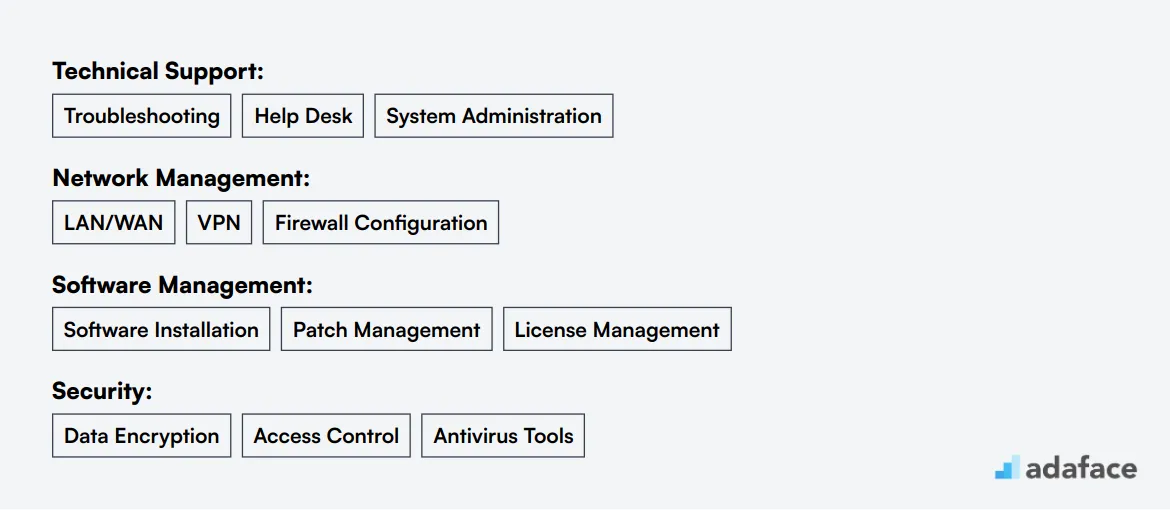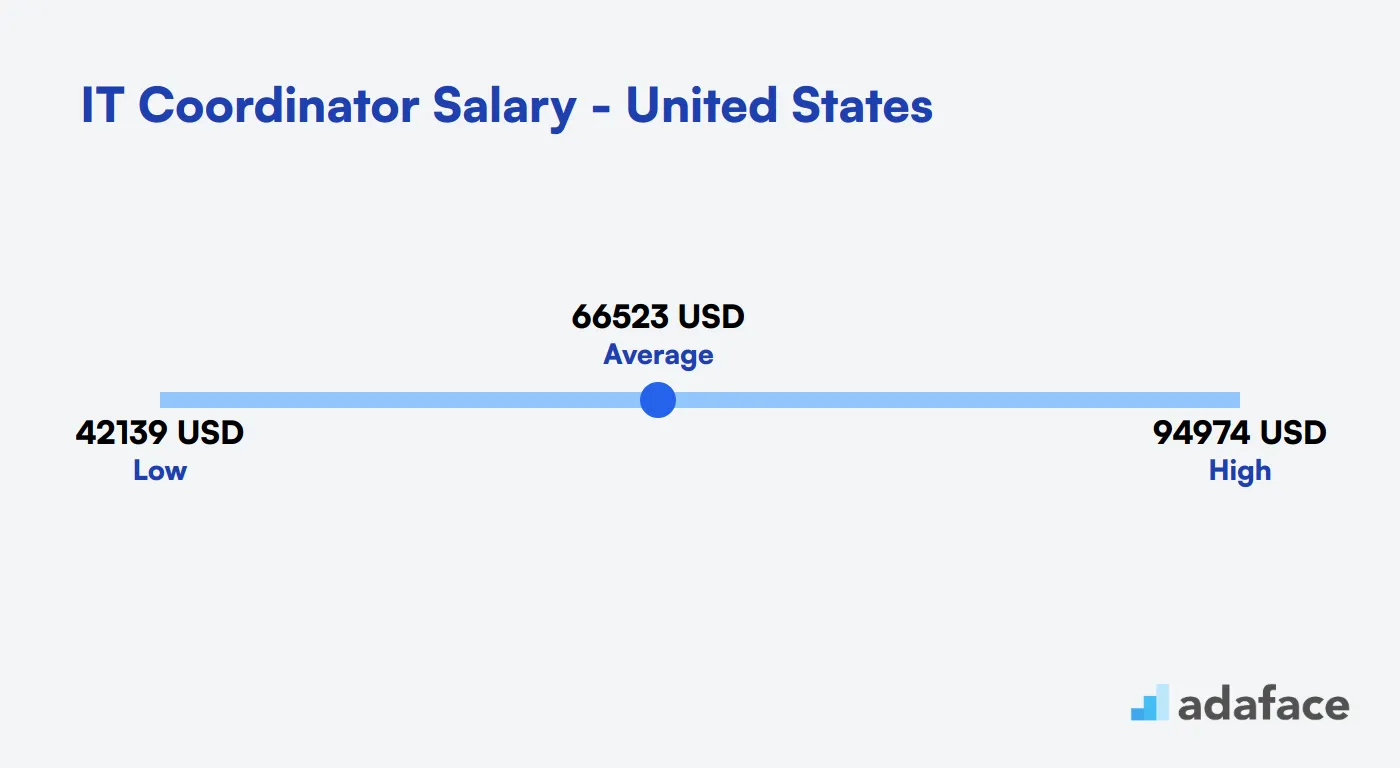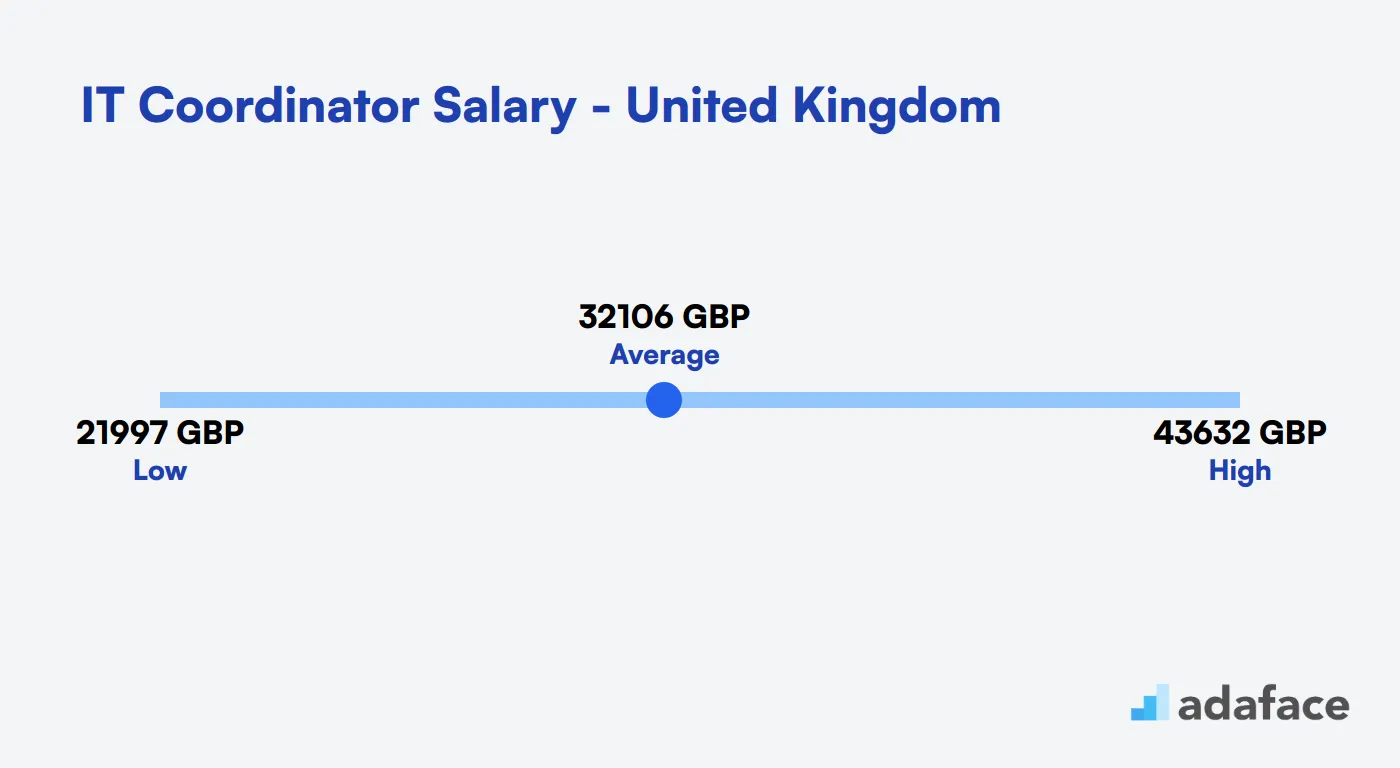Hiring an IT Coordinator can be a game-changer for companies looking to streamline their technology management. Many businesses struggle to find the right candidate because they overlook the balance of technical proficiency and excellent communication skills that the role demands. Often, companies focus too much on technical skills and forget to evaluate how well candidates can bridge the gap between IT and other departments. A successful IT Coordinator should not only be technically savvy but also adept at problem-solving and liaising between teams.
In this comprehensive guide, we'll explore the role of an IT Coordinator, discuss the skills and qualifications to look for, and provide a roadmap for hiring the right candidate. You'll find insights on writing job descriptions, assessing resumes, and leveraging platforms to find top talent. For more information on crafting an effective job description, you can refer to our IT Coordinator Job Description page.
Table of contents
What does an IT Coordinator do?
An IT Coordinator is like the conductor of an orchestra, harmonizing technology and business processes to ensure smooth operations. They bridge the gap between an organization's IT needs and its overall goals, helping to implement and manage IT systems effectively.
Day-to-day responsibilities of an IT Coordinator include:
- Managing IT infrastructure: Overseeing the installation, configuration, and maintenance of hardware and software systems.
- Supporting users: Providing technical support and training to staff, ensuring everyone can utilize technology effectively.
- Coordinating projects: Working with various departments to plan and implement IT projects that align with business objectives.
- Monitoring systems: Regularly checking systems for performance and security issues, and implementing solutions when problems arise.
- Developing policies: Creating and updating IT policies to ensure data security and compliance with regulations.
For more insights on this role, you might find our IT Coordinator interview questions helpful.
IT Coordinator Hiring Process
The IT Coordinator hiring process typically takes around 4-6 weeks. Here's a quick overview:
- Define the IT Coordinator job description and post it on relevant job boards.
- Review resumes and shortlist candidates within the first week.
- Conduct skill assessments and coding tests for shortlisted candidates in the second week.
- Schedule and conduct interviews with the top candidates in the third and fourth weeks.
- Make the final hiring decision and extend an offer to the selected candidate.
While the timeline may vary, the entire process typically takes around 4-6 weeks from start to finish. Let's dive into the details of each step.
Key Skills and Qualifications for an IT Coordinator
Crafting the ideal candidate profile for an IT Coordinator can be tricky. It's important to distinguish between must-have skills and nice-to-have qualities that fit your company's specific needs. Here's a quick guide to help you identify the core competencies and desirable attributes for this role.
When evaluating candidates, focus on their technical knowledge, organizational abilities, and communication skills. These form the backbone of an effective IT Coordinator. Consider using skills assessment tools to objectively measure these competencies.
| Required skills and qualifications | Preferred skills and qualifications |
|---|---|
| Bachelor’s degree in Information Technology, Computer Science, or related field | Experience with project management software |
| Two or more years of experience in IT coordination or related role | Certification in ITIL or PMP |
| Strong knowledge of IT systems and applications | Understanding of data protection regulations |
| Excellent organizational and coordination abilities | Experience in vendor management |
| Familiarity with security protocols and standards | Proven success in a team-oriented environment |
How to write an IT Coordinator job description?
Creating an effective job description for an IT Coordinator is key to attracting skilled candidates. Once you've outlined your ideal candidate profile, the next step is articulating that in the job description.
- Highlight key responsibilities: Clearly define the daily tasks and major projects the IT Coordinator will handle. This helps candidates understand their impact on the organization and what a successful role looks like.
- Balance technical skills with soft skills: List essential technical qualifications such as familiarity with network management and IT support alongside soft skills like communication and teamwork. This ensures you attract candidates who are not only skilled but can also thrive in your workplace culture.
- Showcase your company and role's unique selling points: Discuss what makes your organization special, whether it’s innovative projects, a collaborative environment, or opportunities for advancement. Engaging candidates with your company culture can set you apart from others in your industry.
10 platforms to find IT Coordinators
Now that you have a detailed job description, the next step is to list it on various job platforms to attract qualified IT Coordinators. Choosing the right platform is crucial to reaching the right candidates, whether you're looking for full-time, remote, or freelance talent.
LinkedIn Recruiter
Ideal for finding full-time IT Coordinators due to its large professional network and filtering options.

Indeed
Great for reaching a large pool of candidates and offers tools for managing applications.

FlexJobs
Perfect for listing remote IT Coordinator positions due to its focus on flexible work.

The remaining platforms offer a variety of options depending on your hiring needs. Upwork is ideal for securing freelance IT Coordinators with its vast pool of contractors. For tech-specific roles, Dice provides an excellent platform dedicated to IT jobs. If you're a startup, AngelList Talent connects you with candidates who thrive in startup environments. Glassdoor for Employers and ZipRecruiter are great for posting full-time roles and are known for their broad reach. For remote positions, Remote Work Hub specializes in listings that cater to remote job seekers. Finally, Toptal offers a way to hire highly skilled freelance IT Coordinators with its rigorous vetting process. For more information on how to attract the best technical talent, you may find our article on attracting technical talent helpful.
Keywords to Look for in IT Coordinator Resumes
Resume screening is a critical first step in hiring an IT Coordinator. It helps you quickly identify candidates with the right skills and experience before moving on to interviews.

When manually screening resumes, focus on key technical and soft skills. Look for keywords like 'network management', 'technical support', and 'software management'. Also, keep an eye out for organizational and communication skills, which are essential for this role.
To streamline the process, consider using AI-powered tools for initial screening. These can help you quickly sort through large volumes of resumes based on predefined criteria and keywords.
Here's a sample prompt for AI-assisted resume screening:
TASK: Screen resumes for IT Coordinator role
INPUT: Resumes
OUTPUT: For each resume, provide:
- Email id
- Name
- Matching keywords
- Score (out of 10)
- Recommendation
- Shortlist (Yes, No, Maybe)
KEYWORDS:
- Technical Support (Troubleshooting, Help Desk)
- Network Management (LAN/WAN, VPN)
- Software Management
- Security (Data Encryption, Access Control)
- Bachelor's degree in IT or related field
- 2+ years experience in IT coordination
- [ITIL or PMP certification](https://www.adaface.com/assessment-test/project-management-test)
Recommended Skills Tests for IT Coordinator Assessment
Skills tests are an effective way to evaluate IT Coordinator candidates beyond their resumes. They provide objective insights into a candidate's technical abilities and problem-solving skills. Here are five key tests we recommend for assessing IT Coordinators:
IT Fundamentals Test: This IT test covers basic concepts in hardware, software, networking, and security. It helps gauge a candidate's overall understanding of IT systems and infrastructure.
System Administration Test: A system administration online test assesses skills in managing operating systems, networks, and server environments. This is important for IT Coordinators who often handle day-to-day system operations.
Basic Computer Skills Test: This test evaluates proficiency in using common office software and performing basic troubleshooting. It's useful for ensuring candidates can handle routine IT tasks efficiently.
Project Management Test: IT Coordinators often manage small projects or assist with larger ones. A project management test helps assess their ability to plan, organize, and execute IT initiatives.
Communication Test: Effective communication is key for IT Coordinators who interact with various departments. A communication test can evaluate a candidate's ability to explain technical concepts clearly and collaborate with non-technical staff.
How to structure interviews for hiring IT Coordinators
Candidates who pass the initial skills tests should advance to the technical interview stage to assess their hard skills. While skills tests help filter out unfit candidates, they might not identify the best-suited individuals for the role. At this stage, asking the right questions is crucial to evaluate core competencies and practical knowledge.
Sample interview questions can include: Can you explain a time when you had to troubleshoot a network issue? This question evaluates problem-solving skills and technical understanding. What steps would you take to implement a new software system? helps gauge project management capabilities. How do you ensure data security and compliance? This reveals their knowledge on protecting sensitive information. Describe a situation where you had to work under pressure. Analyzes stress management skills, important given the role's demands. Lastly, How do you prioritize and manage multiple IT projects? tests their organizational skills. For more insights, consider IT Coordinator interview questions.
How much does it cost to hire an IT Coordinator?
The cost of hiring an IT Coordinator varies based on location, experience, and industry. On average, an IT Coordinator in the United States earns around $66,523 per year. However, salaries can range from $42,139 to $94,975, depending on factors like location and experience level.
Keep in mind that the total cost of hiring includes more than just the base salary. You'll need to factor in benefits, taxes, equipment, and potential training expenses. It's best to consult with your HR department or a recruitment specialist to get a more accurate estimate for your specific situation.
IT Coordinator Salary United States
On average, an IT Coordinator in the United States earns approximately $66,523 annually. Depending on the location and experience, salaries can range from about $42,139 to $94,975. For instance, Washington, DC offers some of the highest salaries with a median of $103,788, whereas Austin, TX has a median of around $52,091.

IT Coordinator Salary in the United Kingdom
The average salary for an IT Coordinator in the United Kingdom is approximately £30,000 per year. Salaries can vary widely based on experience and location, with entry-level positions starting around £25,000 and more experienced coordinators earning up to £40,000. London typically offers higher salaries due to the cost of living and demand for tech talent.

What's the difference between an IT Coordinator and an IT Support Specialist?
At first glance, an IT Coordinator and an IT Support Specialist may seem to overlap since both roles involve IT operations. However, there are distinct differences that set them apart, primarily in the scope and focus of their responsibilities.
An IT Coordinator is responsible for managing overall IT operations. This role often requires a bachelor's degree in IT or a related field and 3-5 years of experience. IT Coordinators handle planning and coordination, manage budgets, interact with vendors, and may lead small teams. They play a significant role in project management, ensuring all IT functions align with the organization's goals.
On the other hand, an IT Support Specialist focuses on direct user support and troubleshooting technical issues. Typically, this role requires an associate's degree or certifications and 1-3 years of experience. Support specialists are usually individual contributors who address specific technical problems and have minimal involvement with project or vendor management.
Understanding these distinctions is key when hiring for these roles. For more insights on skills required for key IT roles, refer to our comprehensive resources.
| IT Coordinator | IT Support Specialist | |
|---|---|---|
| Primary Focus | Overall IT operations management | Direct user support and troubleshooting |
| Scope of Responsibility | Broader, includes planning and coordination | Narrower, focused on technical issues |
| Education Level | Bachelor's degree in IT or related field | Associate's degree or certifications |
| Experience Required | 3-5 years | 1-3 years |
| Project Management | Significant involvement | Limited or none |
| Vendor Management | Regular interaction and negotiation | Minimal involvement |
| Budget Responsibilities | Often involved in budgeting | Rarely involved in budgeting |
| Team Leadership | May lead small teams | Usually individual contributor role |
What are the ranks of IT Coordinators?
Many hiring managers often confuse the role of an IT Coordinator with other IT positions. Understanding the hierarchy of IT roles can help clarify these distinctions and ensure you find the right fit for your organization.
Junior IT Coordinator: This entry-level role typically involves assisting senior IT staff with basic tasks, such as managing equipment and providing support for technical issues. Junior IT Coordinators often gain valuable experience that paves the way for advancement.
IT Coordinator: An IT Coordinator manages the day-to-day operations of the IT department. They oversee IT projects, coordinate team activities, and ensure that all technology resources are functioning effectively to support business objectives.
Senior IT Coordinator: This role typically involves more responsibility, including strategic planning and decision-making for IT initiatives. Senior IT Coordinators often mentor junior staff and collaborate with other departments to align IT goals with overall business strategies.
IT Manager: The IT Manager oversees the entire IT department, including IT Coordinators and other staff. They are responsible for budgeting, policy development, and ensuring that the technology infrastructure supports the organization's needs. For more information on the responsibilities of an IT Manager, visit our IT Manager job description.
Hire the Best IT Coordinators
Throughout this guide, we've covered the role of IT Coordinators, the hiring process, key skills, job descriptions, platforms to find candidates, resume screening, and interview techniques. We've also explored the costs involved and how IT Coordinators differ from IT Support Specialists.
The key takeaway is to use detailed job descriptions and skills tests to make your hiring process more accurate. By focusing on both technical and soft skills, you'll be better equipped to find IT Coordinators who can truly excel in your organization.
FAQs
An IT Coordinator is responsible for managing and supporting the IT infrastructure of a company, coordinating between IT teams and other departments, troubleshooting technical issues, and ensuring smooth operation of IT systems.
A good IT Coordinator should possess a degree in Information Technology or a related field, have strong technical skills, excellent communication abilities, and experience in project management.
An effective job description should outline the role's responsibilities, required qualifications, and key skills. It's important to be clear about expectations and company culture. For more details, check our guide on IT Coordinator job descriptions.
You can find qualified candidates on platforms such as LinkedIn, Indeed, and specialized tech job boards. Networking events and referrals can also be valuable sources.
Look for relevant technical skills, previous experience in a coordination role, problem-solving abilities, and any projects or achievements that demonstrate effective IT management.
Structure interviews to assess both technical skills and soft skills such as communication, problem-solving, and the ability to work collaboratively. Include scenario-based questions to evaluate real-world problem-solving.
An IT Coordinator focuses on managing IT systems and coordinating with different departments, while an IT Support Specialist primarily provides technical support and resolves IT issues for end-users.

40 min skill tests.
No trick questions.
Accurate shortlisting.
We make it easy for you to find the best candidates in your pipeline with a 40 min skills test.
Try for freeRelated posts
Free resources



